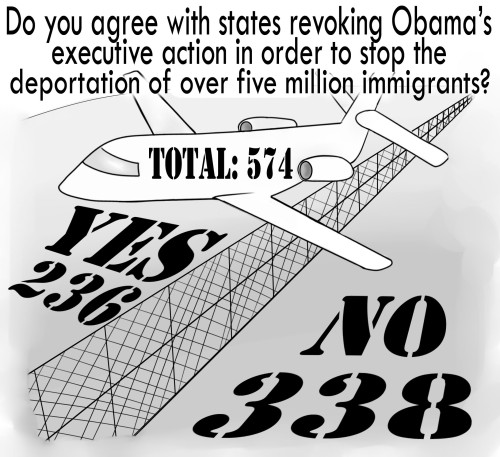States Challenge Obama’s Immigration Reform
From Nov. 20-21, 2014, President Barack Obama announced a series of executive orders, together called the Immigration Accountability Executive Action, that would protect up to five million undocumented immigrants from deportation. Seen as an overstep of presidential authority by Republicans, the plan immediately drew criticism and legal opposition, including multiple lawsuits filed by states, Republican senators and House members. On Feb. 16, one day before the immigration order would have taken place, a Texas federal judge suspended the action indefinitely.
According to the Huffington Post, Obama’s execution action would have allowed certain groups of undocumented immigrants to apply for deportation relief, including parents of U.S. citizens and those who came to the U.S. as children. They would have received work authorization and Social Security numbers and be required to pay taxes; citizenship would not have been granted. Obama said that he took action due to the inability of House Republicans to pass any immigration reform and that he would revoke his action if Congress passed a bill he found acceptable, according to U.S. News.
Shortly after Obama’s announcement, 12 states, 33 cities and 27 heads of local law enforcement agencies expressed their support for Obama’s plan, according to the American Immigration Council. On the other hand, a coalition of states led by Texas, home to one of the largest undocumented immigrant populations in the country, challenged the president in a lawsuit. The coalition now includes 26 states, mostly states in the Midwest and South, according to MSN News.
According to the American Immigration Council, Obama’s action was within his authority and was expected to aid the nation’s economy. Obama’s administration and supporters have pointed out that past presidents, including Republicans Ronald Reagan and George H.W. Bush, had made similar executive actions protecting undocumented immigrants, decisions which inspired little controversy at the time, according to the Associated Press.
However, according to the states opposing Obama, the action decision violated Constitutional clauses limiting presidential power. Moreover, the federal judge who blocked Obama’s action said that the administration had not followed proper procedure for changing federal laws and that the program would burden states, strain budgets and increase illegal immigration.
“I agree with Obama because he supports the union of families. No one wants to separate families; that’s immoral. I came here last year because of family; my grandfather waited 10 years for us,” junior Sophia Lo said. “I know when [some immigrants] try to come to the U.S., they have a lot of difficulty [with citizenship]. I don’t support immigrants that are illegal, but the [government] should give them time to apply for citizenship.”
To oppose Obama’s plan, Congressional Republicans had threatened to suspend funding of the Department of Homeland Security until the issue was resolved, and thus prevent the order from being carried out. However, after a three month impasse, Congress was able to pass a bill that fully funded the department.
